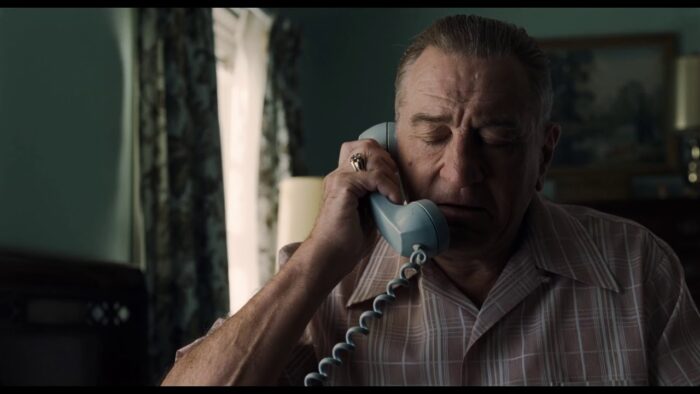
The Irishman, based on the narrative non-fiction book I Heard You Paint Houses, is Martin Scorsese’s 25th narrative feature as director. Scorsese is no stranger to directing movies, and this film works as a lamenting culmination of all of his previous work. With fantastic performances from the likes of Robert DeNiro, Joe Pesci, and Al Pacino, this film will go down as one of his best, and perhaps even most personal, films yet.
What kind of man makes a call like that?…
– Frank Sheeran, The Irishman
Leading up to my viewing of this film, I did a Scorsese-De Niro and Scorsese mob movie marathon. I swooned over many of Scorsese’s past films over the couple of months prior, and as much as I absolutely love so many of Scorsese’s movies, this may have set itself at the pinnacle.
There was a lot of buzz and talk about this film. The acting is incredible. We get De Niro, Pesci, and Pacino all at their best. I don’t think there’s any question about that. Yes, the movie is long, and yes, you feel it. But that’s sort of the point of its length (more on this later). The de-aging CGI was okay, though there are a few scenes where the physicality of De Niro didn’t match his supposed age, leading to much criticism of the execution of this technology. This, however, wasn’t very distracting and pretty insignificant in my opinion. There are many other squabbles about aspects of this film in addition to these main ones. But to me, the acting, directing, and story transcend all of this. There are a ton of great moments and performances, but I have a lot to say already without getting into all that. So, here goes…
What we have in The Irishman is a movie that I believe Scorsese and his trio of stars (De Niro, Pesci, Pacino) could only have made at this point in their careers. They wouldn’t have had the perspective or wisdom to make this film in 1990 when Goodfellas was released. That’s why I think this movie is a true cinematic treasure. And this is not just because so many pieces of this film feel like the culmination of much of his past work in this genre. It’s because of the mood that runs through the film and the way it culminates with an ending more direct and emotional than almost anything else he’s ever made (except for maybe Silence).
The movie is long and winding. You sort of age with the characters, sitting with them in their conversations and driving with them on their way to a job. What distinguishes this film from his other mob movies for me is the fact that it is never glamorized in the way it is in films like Goodfellas or Casino. No one ever really feels settled or comfortable. No one is really at peace. The character that seems most at peace (Pesci’s Russ) because of his reserved and calm demeanor is certainly never at peace with all that he is responsible for. That is why he doesn’t hesitate to call for a hit on anyone, no matter how close he is to them. And certainly this film shows us a glimpse into the thought-life of Scorsese, a man that is seemingly never at peace with himself, a man that seems to have an obsession with guilt and past sins and how those affect ones well being.
—Spoilers Below—
This all centers around Frank Sheeran, who De Niro plays with amazing skill and precision. He is always willing to do whatever is asked of him, but his glazed over eyes and occasional bumbling of words in conversation show us he’s never quite sure what to do with himself. When doing a hit or job for Bufalino or Hoffa, he acts with promptness. He never thinks, just does. He does this for so long that when asked to kill someone closest to him, he barely seems to hesitate. It isn’t until he has to make that phone call that he finally seems to get hit with the weight of who he has become. This is why when talking to the priest, he doesn’t even question himself about the hit but instead says the line quoted at the start, “What kind of man makes a call like that?” That was the moment he saw himself for the first time. (And it’s one of the best moments of acting in the film. It’s an incredibly powerful moment!)
We finally get a man who is coming to the end of his life, dealing with the finality of all that he has done. He finally sees that he needs to change, but it’s too late to change all the relational rifts he has created with his family. His daughter, Peggy, acts as his conscience throughout the movie. Her eyes are like a gun loaded with shame, but by the time Frank becomes vulnerable to their damage, it is too late. Peggy will no longer talk to him or see him. And with the loss of this daughter that was an external conscience for him, he loses the ability to feel anything for what he’s done, as he confesses to the priest. He cannot deal with the finality of the death that faces him not because he is afraid of dying but because, more specifically, he is afraid of dying as the man he is, of leaving this world without being able to right any of his wrongs. And that is why it’s hard for me to decide what I think of the open door that holds our view in the final shot. Is this open door to give us hope or leave us hopeless? Does it leave us full of guilt and fear of the finality of our sin? Or does it leave us looking at a man where the desire and possibility for change and resolve is still open? I’m not sure what Scorsese wants to leave us thinking, but I also think that’s sort of the point.

It’s what it is.
– Russell Bufalino, The Irishman
What the end of this movie did for me was to set the weight of Frank finally reckoning with himself on my heart as well. In those closing scenes, the finality of my own sins brought an overwhelming sense of dread into my heart. Frank’s self reflection became my own self reflection. And his guilt became my own. The difference is, I haven’t become a man that can’t feel the true weight of that anymore. I have the chance to change, to reconcile, to make amends, to become who I should be. The Irishman appropriately begins and ends in that assisted living home. I’ve sat with strangers in these facilities before across from old men that plead with you to do better than they did. That’s what this film is. It’s Scorsese, De Niro, Pesci, and Pacino pleading with you to be better, to be the best you can be, to not make the same mistakes they did. And, man, does it hit home. “It’s what it is,” doesn’t have to be the final word for your life and mine.





